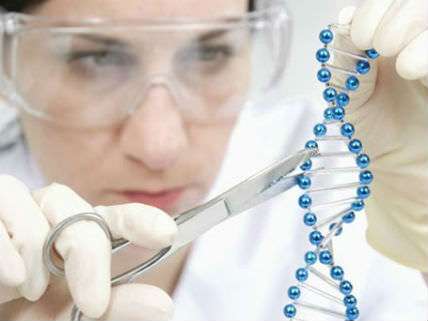Easy New Gene Editing Technique CRISPR Conjures Fears of a Brave New World
Is it immoral to slow progress toward curing diseases and creating more environmentally benign products?

Three years ago, researchers discovered a super-precise and simple gene editing technique based on how bacteria protect themselves from being infected by viruses. The technique is called CRISPR-Cas9. CRISPR stands for "clustered regularly interspaced short palindromic repeats" that recognize and enable the destruction of viruses that attack a bacterium. Cas9 is an enzyme that cuts gene sequences. CRISPR has now been modified in ways that enable researchers to make very precise changes in the genomes of any cells in any organism. The technique is also much easier and cheaper to use than earlier gene-editing technologies.
Earlier this year, a self-selected committee of prominent researchers issued a letter in Science calling for a broad public discussion of the implications of this powerful new technology. They especially urged that steps be taken to…
…Strongly discourage, even in those countries with lax jurisdictions where it might be permitted, any attempts at germline genome modification for clinical application in humans, while societal, environmental, and ethical implications of such activity are discussed among scientific and governmental organizations.
To the consternation of some, Chinese researchers published a study a little over a month later in which they reported their results from trying to use CRISPR to correct the genetic defect that causes the blood disorder beta-thalassemia in human embryos.
Wired has just published a fascinating article, "Easy DNA Editing Will Remake the World. Buckle Up," that details how CRISPR was discovered and explores some of its potential uses. Wired reports:
Using the three-year-old technique, researchers have already reversed mutations that cause blindness, stopped cancer cells from multiplying, and made cells impervious to the virus that causes AIDS. Agronomists have rendered wheat invulnerable to killer fungi like powdery mildew, hinting at engineered staple crops that can feed a population of 9 billion on an ever-warmer planet. Bioengineers have used Crispr to alter the DNA of yeast so that it consumes plant matter and excretes ethanol, promising an end to reliance on petrochemicals. Startups devoted to Crispr have launched. International pharmaceutical and agricultural companies have spun up Crispr R&D. Two of the most powerful universities in the US are engaged in a vicious war over the basic patent. Depending on what kind of person you are, Crispr makes you see a gleaming world of the future, a Nobel medallion, or dollar signs.
Why not all three? Wired continues:
The technique is revolutionary, and like all revolutions, it's perilous. … It could at last allow genetics researchers to conjure everything anyone has ever worried they would—designer babies, invasive mutants, species-specific bioweapons, and a dozen other apocalyptic sci-fi tropes.
Doubtless CRISPR, like any technology, can (and will be) abused. As noted by Wired, one worry is that CRISPR might used to create bioweapons. But the faster exploration and development of the technology will also enable researchers to rapidly devise counter-measures to weaponized bacteria and viruses. Ultimately, going slow out of fear of misuse would deny suffering people access to cures and to more environmentally benign products of all sorts. If using refined and effective CRISPR gene-editing techniques to cure disease, correct defective genes or create more productive crops is moral, then it is immoral to slow progress toward achieving those goals.
See also my Reason TV colleague Zach Weissmueller's intriguing Q&A with Cambrian Genomics' Austen Heinz: 3-D Printing DNA: Hacking Life's Code and Creating New Organisms below.
"To think that we can't make organisms that aren't more efficient than existing, I don't think is correct," says Austen Heinz, founder of the biotech startup Cambrian Genomics. "Because nature doesn't have DNA laser printers, and we do."
Reason TV's Zach Weissmueller sat down with Heinz to discuss the ramifications of a technology that dramatically brings down the cost of sequencing and assembling DNA, suddenly making the ability for consumers to create their own organisms an economic reality. Heinz partnered with a company to crowdfund a "glowing plant," which led to a subsequent ban on GMO-related projects on Kickstarter, and he expresses concern with the lagging regulatory structure governing biotech development. But Heinz is undeterred by regulatory and cultural obstacles and foresees a future where consumers can affordably leverage his technology to fix errors in their own DNA or even design their own creatures in the same way that 3-D printing companies like MakerBot allow for custom models.


Show Comments (89)